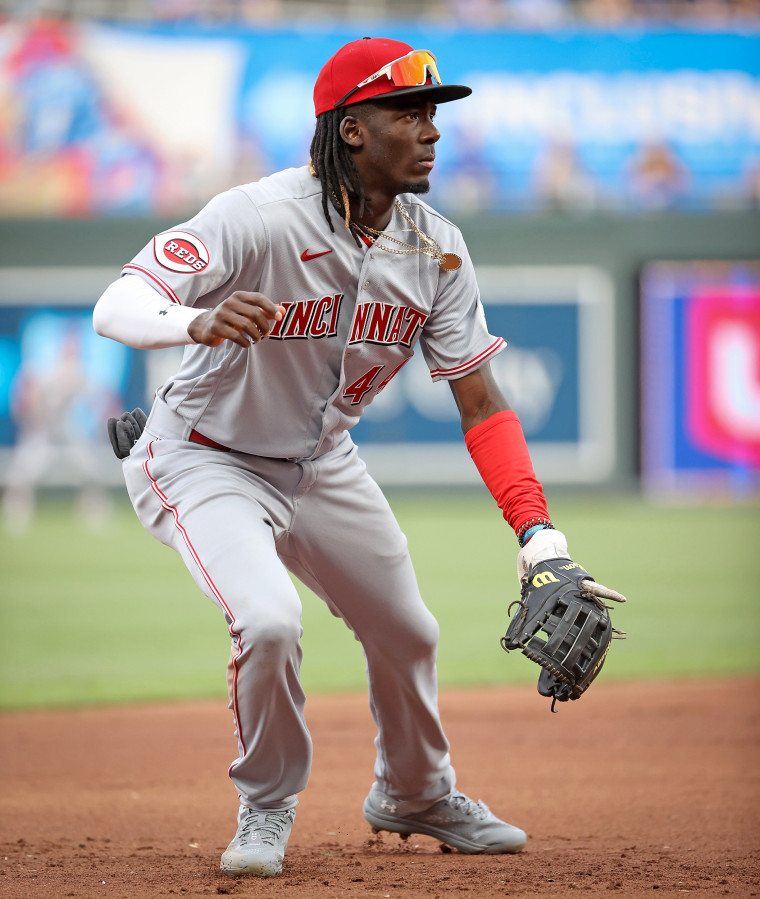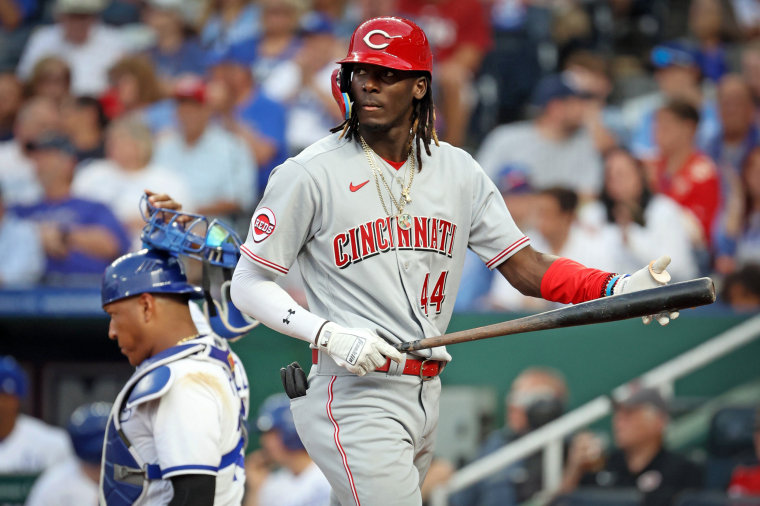Cincinnati Reds rookie shortstop Elly De La Cruz is having a historic start to what could be a Hall of Fame career. In his first three games as a Major League Baseball player, not only did the 21-year-old crush a 458-feet home run, he also became only the second player in at least 123 years to homer, get a single, double, triple and a stolen base in his first three games. De La Cruz, who made a throw to first clocked at 96 mph, could go down as one of the best shortstops to ever play the game and earn hundreds of millions of dollars over the course of his career.
De La Cruz, whose throws to first have been clocked at around 96 mph, could go down as one of the best shortstops to ever play the game.
But because he’s a client of Big League Advantage, an investment firm that on average gives minor league players an upfront payment of $350,000 in exchange for 8% of their future Major League Baseball earnings, if De La Cruz does earn hundreds of millions of dollars in the majors, then he’ll likely owe BLA tens of millions of dollars.
That’s one of the stark realities of America’s pastime: The systemic exploitation of players, especially Black Spanish-speaking Latino ones, is as linked to the game as hot dogs, peanuts and cold beer.
Before BLA, there were shady agents from the Dominican Republic promising Cuban players the world before crushing their dreams. Also before BLA, there was the dreaded reserve clause, which, before Curt Flood successfully challenged it more than 50 years ago, made players a team’s property. And we can’t forget the existence of Maor League Baseball academies in poor countries such as the Dominican Republic or reports that big league clubs, in violation of league rules, are entering into handshake agreements with talented boys as young as 12.
In response to a 2020 USA Today investigation about young boys being pulled into such deals, Major League Baseball told the newspaper in a statement, “We are clear with clubs, players and their agents that any agreements or understandings prior to the date when a player is eligible to sign are completely unenforceable and are not recognized by our office.”
Given the above history, BLA is part of professional baseball's long problematic history. But CEO Michael Schwimer, a former MLB relief pitcher, says that BLA is simply misunderstood.
“We always hear that we are taking advantage of players,” Schwimer told The Action Network this month. “There could be nothing further from the truth. We give players money, they decide how much they want to give back to us. If they make it, we do well. If they don’t, it’s not a loan, so they don’t have to give it back to us.”
A promising teenager can get thousands from BLA while he’s in the minor leagues but has to pay back millions when he gets a big money contract.
He’s right that it’s not a loan. A loan requires a borrower to pay back the amount borrowed, typically with interest. A BLA contract requires players to pay BLA a percentage of their future earnings, which for some players will be many times more than what BLA fronted that player. A promising teenager can get thousands from BLA while he’s in the minor leagues but has to pay back millions when he reaches the majors and gets a big-money contract.
Schwimer told The Associated Press in 2021 that $350,000 was the average amount it had given a player. BLA may characterize the arrangement as an investment and liken what it does to what venture capitalists do, but Schwimer's assertion that BLA doesn't take advantage of players doesn't mean the relationship can't be predatory.
HBO’s Real Sports reported in 2021 that 50% of BLA clients come from poorer Caribbean basin countries including the Dominican Republic, which accounted for 11% of all MLB players in 2023, and Venezuela, which accounted for about 6.5% of players.
In a 2021 interview with the AP about BLA, baseball superagent Scott Boras said BLA’s “primary target is indigent and talented players from Latin America” because “few if any top American talents who received large signing bonuses would ever consider the usurious terms.”
There is a more significant issue at play, though. The current talent system in baseball is already exploitative and broken. Minor league players are seasonal workers who only make between $20,000 and $42,000 per season on their first contract, and that's after a recent collective bargaining agreement.
BLA has seized on the fact that minor leaguers are paid so little and that the road to big league stardom can be expensive, especially in a competitive talent pool where everyone is looking for an edge. BLA argues that more money in a young player’s pocket gives that player more opportunity for better trainers, nutrition and housing, which is what Fernando Tatis, Jr. said he used the money for after he signed with BLA as a minor leaguer.
We donate to every player’s charities and, if they don’t make it, we activate our investors, who have a combined net worth of over $100 billion, to help them find jobs.
BIG LEAGUE ADVANTAGE CEO Michael schwimer
“It was just a family decision,” Tatis said about BLA in 2021. “I’m just going to call it that way.”
Just like a gambler spreading bets at a roulette table, all BLA needs is for a Tatis or a De La Cruz to hit it big to make money. For example, when Tatis signed his massive $340 million contract in 2021, he owed an estimated $27 million to BLA (That amount is based on Schwimer’s statement to the Wall Street Journal that BLA typically gets 8% of a client’s big league contract).
Schwimer said in that interview to The Action Network that BLA has 530 baseball players signed up. He said, “We donate to every player’s charities and, if they don’t make it, we activate our investors, who have a combined net worth of over $100 billion, to help them find jobs.”
It’s telling, though, that Francisco Mejía, who signed with BLA in 2016 and says he received $360,000 in exchange for 10% of future major league earnings, thought the company was something other than generous. Two years later, while he was still in the minor leagues, the catcher filed a lawsuit alleging that BLA had taken advantage of him when his "mother was very ill and the family needed significant funds to pay for her medical treatment."
After that lawsuit was filed, Schwimer told ESPN, “We asked Francisco if he understood that if he made $500 million in his MLB career, he would owe us $50 million throughout his career.” He said, “We also asked if he understood that if he does not make it to the major leagues, he would not have to pay us anything back. He responded in the affirmative on both questions.”
Mejía later dropped the lawsuit and apologized.
“I am happy with my agreement with Big League Advance, and appreciative of the information and support they provided to me. To be clear -- I do not believe Big League Advance has ever deceived me. All of my interactions with Big League Advance and specifically Michael Schwimer have been very professional and respectful,” Mejía said in a statement.

But no one's accusing Big League Advantage of lying to the young talent it signs. What's problematic is BLA signing up such vulnerable players.
Non-U.S.-born Spanish-speaking players with incredible talent are typically poorer than their U.S.-born counterparts, so it’s no surprise that the promise of instant money is alluring. Schwimer makes a point of saying that if the athletes who receive money don’t make the majors, then they don’t have to pay back BLA, a talking point that suggests that he’s at risk of losing a lot of money. But even if certain players don’t need to pay back BLA, they still have to pay taxes on the money BLA gave them.
A lawyer who represents major league players told the AP in 2021 that the Major League Baseball Players Association “should, and has, educated players about the dangers of deals with entities such as Big League Advance, but more education is certainly warranted.”
Baseball needs to stop creating environments that help perpetuate players’ exploitation.
Baseball needs to stop creating environments that help perpetuate players’ exploitation. The league, for example, needs to stop looking at the Dominican Republic as a major source of cheap, available talent and actually invest in the country.
A better way to grow the game would be to put significant and tangible money in the communities these poor players come from. If MLB is going to keep turning to Latin America for talent, then the league should be a key player in eradicating poverty there as well. It should also pay minor leaguers enough money so they’re not as easily seduced by pitches from BLA.
Yes, baseball is a business, but it’s nothing without its superstars, and it should protect them from exploitation. There’s no evidence that De La Cruz has expressed any reservations about signing with Big League Advantage, but if the league took better care of its talent, then he’d never have been in a position to make a decision that means that as he gets bigger, his bills to BLA get bigger, too.

